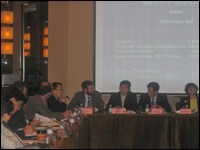Registration
You will receive an email confirming your registration.
IMGXYZ826IMGZYXThe Carnegie Endowment for International peace hosted a workshop entitled “Energy Security and Climate Change” in Beijing on October 20-21. This workshop is one component of the Carnegie project on U.S.-China Climate Cooperation, which works toward developing a framework for a bilateral agreement between the United States and China to reduce greenhouse gas emissions and thus the risk of catastrophic climate change. This workshop brought together professionals from both countries in government, academia, research institutes, and the private sector. Participants presented analysis of current thinking on issues of energy security and climate change and discussed practical possibilities for cooperation between the United States and China.
Workshop participants identified opportunities for action on issues of energy security and climate change: to reduce energy demand in the United States and the growth of energy demand in China, and to promote sources of electric power that use low- and non-carbon energy sources. Participants also discussed the fundamental elements of U.S.-China energy security and climate cooperation. These include setting challenging goals, agreeing on enforceable measures, and cooperating on technology deployment policies and long-term research and development.
The responses to the possibility of international action on climate change within China are different at the official level and expert level. At the official level, the response is that industrialized countries contributed the majority of cumulative emissions over the past half-century; it is their responsibility to address the climate problem. China, as a developing country, should be able to use the energy it needs to develop. At the expert level, however, the response is more cooperative. Climate and energy experts within China describe China as setting ambitious efficiency goals and expressing willingness to cooperate.
